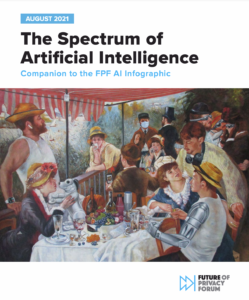Swire Presents at Privacy Working Group
On April 26, FPF Senior Fellow and Ohio State Professor Peter Swire gave a presentation to the Privacy Working Group based on his forthcoming article in the University of North Carolina Law Review, entitled “Social Networks, Privacy, and Freedom of Association: Data Empowerment vs. Data Protection.” The presentation focused on Swire’s new research exploring how social networks, such as Facebook and LinkedIn, are platforms for association, and Swire explored how to establish a legal framework regarding social networks.
Swire examined some of the complex benefits and risks of social networks. Social networks can inadvertently reveal very personal information about individuals and increase privacy concerns. On the other hand, social networks can be used for political mobilization and allow people to freely voice their opinions, such as during the Arab Spring or the 2008 presidential campaign. Indeed, social media has become increasingly essential to associational activity; Swire pointed out that virtually all charities in the U.S. use some form of social media and political campaigns are increasingly relying on social media, too. Social networks, therefore, are an important way people can exercise their First Amendment rights to freedom of association and speech.
Privacy, Swire pointed out, can both help and hinder freedom of association and speech on social networks. Privacy can be essential to protect politically unpopular organizations from harassment. For example, in 1957 the Supreme Court found that the NAACP did not have to divulge its membership lists to the state of Alabama as this would chill free speech. Conversely, privacy controls can make it very difficult for political organizations to find new members, for example by preventing them from easily contacting new potential members.
Swire also explored how the concepts of data empowerment and data protection impact social networks. In the U.S., the debate frequently centers around how to use data in innovative ways (data empowerment). Technology can consequently be used to empower the creation of new associations, a right enshrined in the first amendment. Meanwhile, in the E.U., the debate frequently focuses on how to protect privacy (data protection). Data protection implies that data is fundamentally risky, and that users’ rights frequently outweigh the utility of new uses for data. The tension between these two outlooks can lead to a conflict between rights: freedom to associate vs. privacy.
There are therefore a number of complex legal issues surrounding social networks that have yet to be decided. Swire’s presentation and research are an important step in determining what this framework should look like. However, the details of this legal framework will be very difficult to determine, and as Swire ironically pointed out, “this may turn out to be just as easy as campaign finance reform.”
-Steven Beale
Please find a link to the presentation here.



